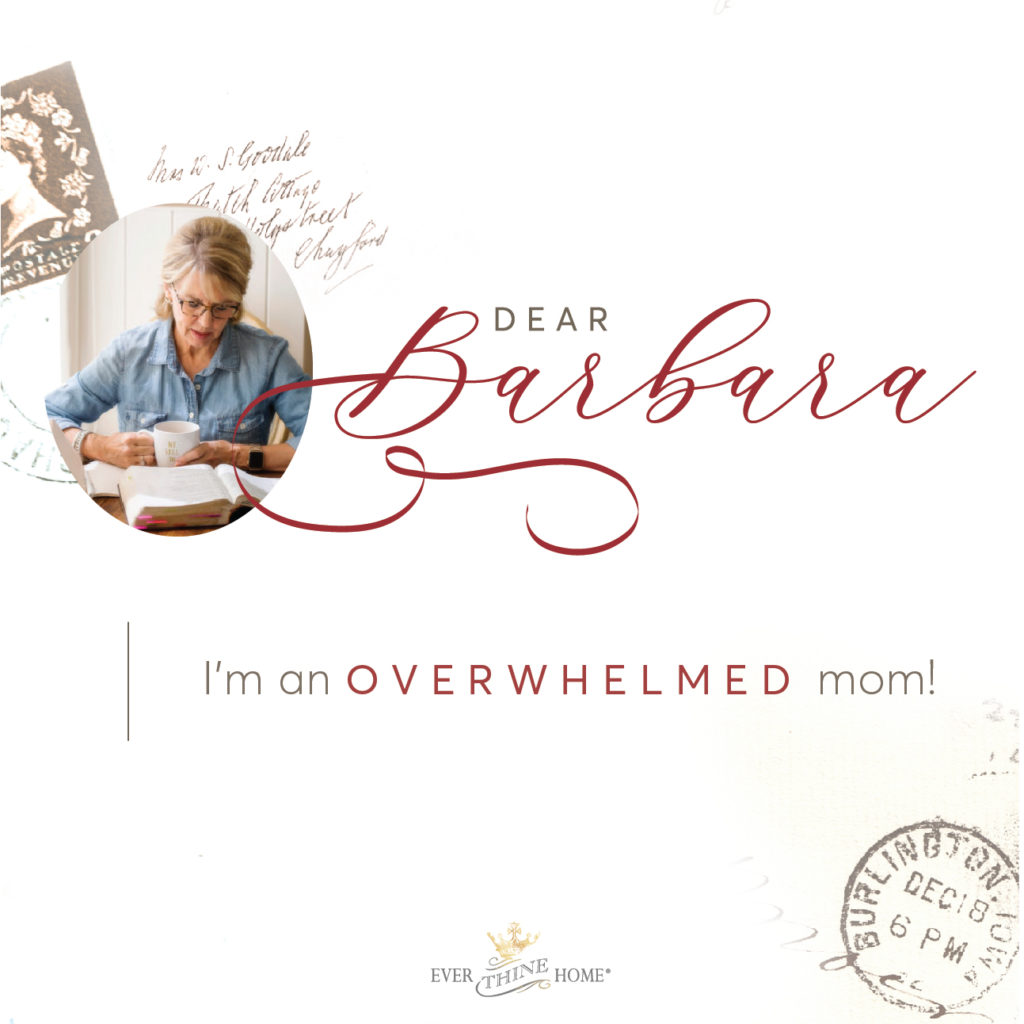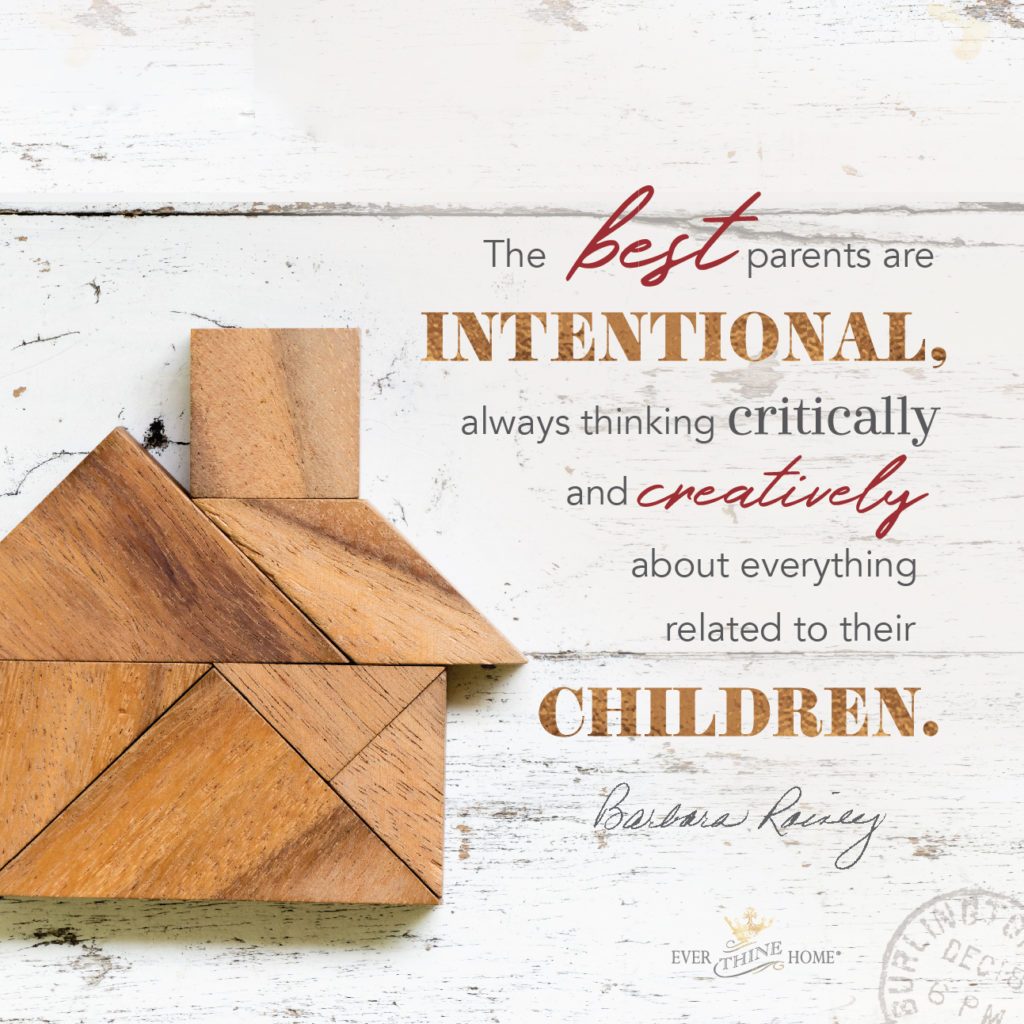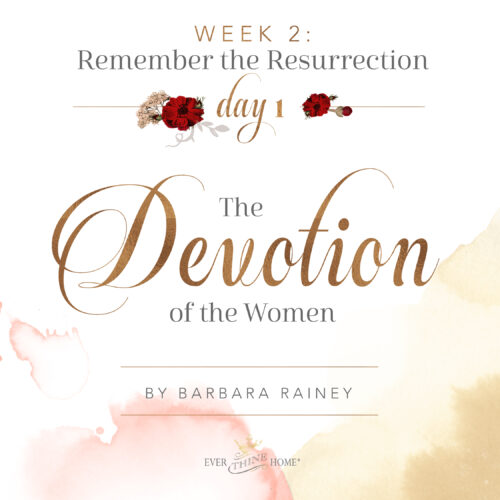
Dear Barbara:
As a 40-year-old with a baby and a 6-year-old, I often feel overwhelmed with all my responsibilities. Don’t get me wrong—I love my family, but I often feel like I just don’t have enough time to get it all done. My friends and I have the financial ability that our mothers didn’t have to hire help, but I feel guilty at times because I feel I should be able to do it all like my mom. Any advice for me?
Dear Millennial Momma:
After raising six children, I can certainly relate to the overwhelming pressure you often feel. There were many times when I felt I was going crazy, and I wondered if I’d survive to the next day.
Since Adam and Eve, no one does marriage or parenting perfectly. No one. But most couples try to do their best in every generation with individual gifting, the knowledge available at the time, and applying God’s Word as wisely as possible.

And you are right … there are differences in generations. For millennia the natural path for most women was to get married, have children and spend the rest of their lives attending to the duties of home and family. It is only in prosperity, now or in past centuries, that women have had the option to hire help outside the family or to spend time in other endeavors in an effort to bring balance to their lives.
Dennis and I tried to make decisions that impacted our balance, our margins and our life outside our kids using a decision grid with four key principles: relationships, seasons, values, and priorities.
- The relationship principle.
Every married Christian mother has at least three life-giving relationships; God, spouse, and children.
Most obvious every day is the relationship with each child. The care and raising of children is a full-time job. Period. Children’s needs are constant. They literally would not survive their early years without the devoted attention of an adult, which is why there have been orphanages worldwide for centuries.
But your marriage relationship comes first. Though it is not a full-time job in the same sense that caring for children is still it is a living relationship that must outlast the children. Husbands and wives need to pay attention to the health of this primary relationship for their own good and the good of their children. It is not optional.
Most important of all is your relationship with God. It is He who gives you life. He possesses everything you need for success in marriage and parenting. He alone can give you stability, hope, strength for the season you are in today: marriage and parenting.
All three of these living relationships need to be fed, nurtured, and encouraged or they will begin to die.
Evaluating these essential relationships in light of any opportunity, job, class, ministry, activity, etc. is the first question on the decision-making grid. Ask, “Will this new opportunity; job, school, church, club or sport help or hinder me with knowing God, my spouse, or my children?”
If it hinders, you need to be courageous and say no.
- The season principle.
Just as there are four seasons in every year by the promise of God, so our lives follow a similar pattern. You, my friend, are in the spring and early summer of your life—the planting season. The days are increasingly long and filled with urgent needs that must be fulfilled or the little people God has given you to nurture and grow will not thrive.
At the same time you have a marriage that needs attention but can often seem too demanding. It is not easy to attend well to the intensity of all the needs in a young family, spouse and children. But the planting season is crucial if you hope to survive the heat of summer (teen years) and ensure all of you arrive still standing strong at harvest time.
One thing that’s important to remember is that this overwhelming season will eventually pass. The planting season is a huge adventure filled with excitement and joy … and lots of pressure. But it will end.
What will carry you through the planting seasons—and all the others—is the constant presence of your unchanging Lord. Learning to talk to and depend on Him throughout your days is the key to growing and experiencing God in all seasons.
Your question about hiring help fits here. Just as farmers hire help in the days of intense deadlines, so you can, too. But remember the farmer never fully delegates his ownership and governing of the land to others. Hired help is usually seasonal and supportive.
If you can afford it and you and your husband agree, you can hire help with cleaning, cooking, grocery shopping and babysitting, so you can have time for yourself, time to develop a skill, talent or friendship. What matters is that you not delegate those three primary responsibilities that only you can do. Only you can feed your husband’s security, spirit and soul. Only you can nurture your children’s security, spirit and soul as their mother. You represent God to your child in more ways than you can see or know. Make sure your time with God and them is still more than your time with other people or other endeavors.
- The values principle.
Each of us as an adult is a repository of various values derived from our families of origin, our varied growing up experiences and our beliefs about God, money, work, mission, art, relationships, etc.
Values determine how we spend our time and money and they influence school, work, church, training and entertainment decisions, to name a few.
At home mom and dad each bring a set of values which sometimes creates conflict when parenting.
Hiring outside help and investing time and or money in personal development as a woman is a values decision. The question is, does it reflect both your values? Perhaps one of you experienced a childhood with two working parents and the other with a working dad and a stay-at-home mom. Neither is right or wrong. Reconciling those values means lots of conversations to understand why you each feel certain qualities are important.
Creating a list of values you and your spouse operate from is a crucial project that will help you in countless decisions in the future. Take the time to begin writing down what you value … those qualities that resonate in your heart … the ones that cause you to say, “I must teach my child to _____.”
Once you both have a list of at least 10 core values, then start the hard work of combining your lists into one, most important to least, that you both agree on. (For more on this values project, read this article or chapter 3 in our book, The Art of Parenting.)
Knowing your agreed upon values helps you operate as parents off the same plan. It reduces, not eliminates, pressure and conflict.
- The priorities principle.
Your priorities are the sum conclusions of the first three principles. Collectively they become your priorities as parents and in your marriage, too.
One of the very best value decisions Dennis and I made over the length of our marriage was going on a date night every week (as often as we could). It was a decision to value our marriage by getting one on one time regularly. But it was more.
This was not usually a romantic date but a working business meeting which valued me as the mom. We brought our calendars or planners and went to a fun casual restaurant where we could sit in a booth and spread out. Over dinner and often for an hour or more afterward we reviewed our lives, the status of our kids (which child needs extra attention that week), our relationship (let’s talk about that conflict we keep having, or when can we plan time away in the next 3-4 months), and our schedules and activities. These weekly date nights were crucial in relieving pressure in my life.
For example, one of our top values was not just parenting with purpose but parenting together, in agreement, united in our focus and direction. This date night helped us stay on the same page. Managing the ongoing needs of our crucial relationships helped us make decisions that created opportunities for growth, for fun, for learning, for bonding. Our number one priority was: win with each other and with our kids, which therefore informed nearly every other decision.
Our collective and agreed-upon values helped us repeatedly say yes to activities, lessons or people that would help us accomplish our goals with our kids. They also helped us say no to many more opportunities that looked good and might have been good but were not the best. Hear me. We learned to say no far more than we said yes.
The best parents are intentional, always thinking critically and creatively about everything related to their children.

Knowing the importance of relationships, shared values and priorities allows couples to live wisely and on purpose in every season of their marriage and parenting journey.
You also asked about feeling guilty because you feel you “should be able to do it all.” You used the word should in your question and I can’t ignore it. Should is a term of condemnation and Romans 8:1 tells us “There is therefore now no condemnation for those who are in Christ Jesus.”
You have limitations. Everyone does. But God is not limited by them. In fact, He delights in them because He hopes they will drive us to talk to Him more, to ask for His help more, to listen to Him more. You shouldn’t be able to do it all. Does that help?
So banish the should word and go to Jesus every time you feel your limitations and inability! It’s by design.

Love and prayers,
Barbara
If you enjoyed this post, check these out:




